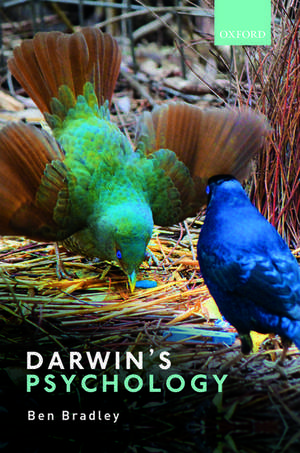Darwin's Psychology: The Theatre of Agency
Ben Bradleyen Limba Engleză Hardback – 8 oct 2020
Preț: 302.37 lei
Preț vechi: 336.69 lei
-10% Nou
Puncte Express: 454
Preț estimativ în valută:
57.86€ • 61.87$ • 48.24£
57.86€ • 61.87$ • 48.24£
Carte tipărită la comandă
Livrare economică 07-12 aprilie
Preluare comenzi: 021 569.72.76
Specificații
ISBN-13: 9780198708216
ISBN-10: 0198708211
Pagini: 432
Dimensiuni: 163 x 241 x 29 mm
Greutate: 0.89 kg
Ediția:1
Editura: OUP OXFORD
Colecția OUP Oxford
Locul publicării:Oxford, United Kingdom
ISBN-10: 0198708211
Pagini: 432
Dimensiuni: 163 x 241 x 29 mm
Greutate: 0.89 kg
Ediția:1
Editura: OUP OXFORD
Colecția OUP Oxford
Locul publicării:Oxford, United Kingdom
Recenzii
In Darwin's Psychology, Bradley provides a necessary corrective to such reductive readings of Darwin's work. Through admirably extensive research and lucid argumentation, the author successfully paints a much richer picture of his achievements ... The volume serves as a testament to close observation and a spirit of wonder that allows nature, in all of its complexity, to genuinely surprise us rather than conforming to our prejudices.
The book's central thesis is that Darwin did not believe evolution accounts for "everything about human action." Climbing plants, the development of babies (the author has made positive contributions describing how infants socialize), facial expression, and problem-solving in earthworms—all are included, indicating that such phenomena in such disparate organisms cannot explain human behavior. Historians and philosophers of science are liberally cited, along with many of Darwin's contemporaries.
Bradley's argument is refreshing and original and is well worth reading, not only for his inventive interventions in the philosophy of psychology, but also for his creative and persuasive interpretations of Darwin's approach to the evolution of mind and behavior.
The heart of Bradley's project-and of his interpretation of Darwin-is a refocus away from natural selection and toward the evolutionary agency of individual organisms...and his delineation of the lessons we can draw from understanding Darwin's theory and practice of psychology, are innovative, insightful, and persuasive.
Darwin's theory and practice of psychology, are innovative, insightful, and persuasive. His book merits, and repays, careful study.
The book's central thesis is that Darwin did not believe evolution accounts for "everything about human action." Climbing plants, the development of babies (the author has made positive contributions describing how infants socialize), facial expression, and problem-solving in earthworms—all are included, indicating that such phenomena in such disparate organisms cannot explain human behavior. Historians and philosophers of science are liberally cited, along with many of Darwin's contemporaries.
Bradley's argument is refreshing and original and is well worth reading, not only for his inventive interventions in the philosophy of psychology, but also for his creative and persuasive interpretations of Darwin's approach to the evolution of mind and behavior.
The heart of Bradley's project-and of his interpretation of Darwin-is a refocus away from natural selection and toward the evolutionary agency of individual organisms...and his delineation of the lessons we can draw from understanding Darwin's theory and practice of psychology, are innovative, insightful, and persuasive.
Darwin's theory and practice of psychology, are innovative, insightful, and persuasive. His book merits, and repays, careful study.
Notă biografică
Ben Bradley was educated at Oxford and Edinburgh, where, with Colwyn Trevarthen, he began his pioneering research on infancy. He later migrated to Australia, where he was appointed Foundation Professor of Psychology at Charles Sturt University in 1998-and where he is now Professor Emeritus. He wrote the widely-translated Visions of Infancy (1989), and Psychology and Experience (2005). Amongst many research highlights are studies: with Jane Selby and Michael Smithson, proving young infants can participate in social groups; and, on the literary structure of Darwin's On the Origin of Species (1859). His film Darwin's Babies, received its world premiere at Darwin 2009: A Celebration of the bicentenary of Darwin's Birth in Cambridge, UK
